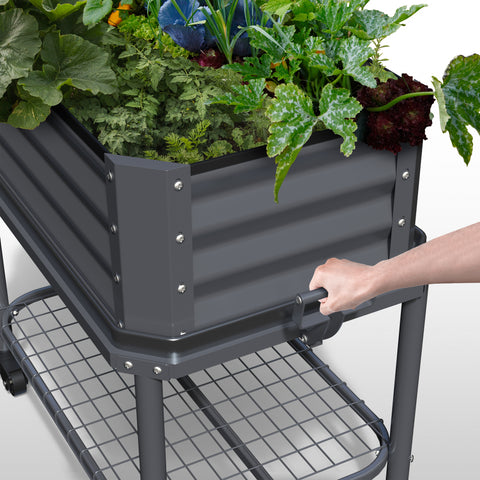Seeds are essential for garden beds, so what are some tips for selecting seeds?The following content also has some reference value for raised garden beds.
1.Select seeds according to climatic conditions: Climatic conditions are key to seed growth, so the climatic conditions of the region must be considered when selecting seeds. For example, planting seeds from tropical plants in cold northern regions may not be successful. Therefore, you need to choose seeds that are suitable for the climate conditions in your area.
Temperature: Different plants have different temperature requirements. Some plants thrive in cold climates, while others need warmer ones. Therefore, when selecting seeds, it is necessary to consider whether the local temperature conditions are suitable for seed growth.
 Precipitation: Water is one of the nutrients necessary for plant growth. Different plants have different water needs, so you need to choose seeds that are suitable for the amount of precipitation in your area.
Precipitation: Water is one of the nutrients necessary for plant growth. Different plants have different water needs, so you need to choose seeds that are suitable for the amount of precipitation in your area.
Light: Light is necessary for plant growth. Different plants have different requirements for light. Some plants need lots of sunlight, while others need shade. Therefore, when selecting seeds, it is necessary to consider whether the local light conditions are suitable for seed growth.
Soil conditions: Different plants have different requirements for soil. Some plants need rich soil to grow, while others can grow on poor soil. Therefore, when selecting seeds, it is necessary to consider whether the characteristics of the local soil are suitable for seed growth.
In conclusion, it is very important to select seeds according to local climate conditions. Only by choosing seeds suitable for local climate conditions can plants grow healthily and vigorously.
2.Consider the purpose of planting: Different seeds are suitable for different purposes. For example, if you want to plant a beautiful garden, then you need to choose flower seeds; If you want to grow vegetables, then you need to choose vegetable seeds.
 3.Understand the characteristics of seeds: Different seeds have different characteristics, such as growth rate, growth cycle, adaptability to the environment, etc. These characteristics need to be considered when selecting seeds to ensure that the seeds can be successfully grown. Read the instructions on the seed package: Usually the seed package will indicate the characteristics of the seed, such as the seed's growth cycle, growth rate, adaptation to the environment, etc. Find related books or websites: There are many seed books and websites that can help you understand the features of seeds. This information can help you choose the right seeds for your own planting and understand how to care for their growth. Consult a professional horticulturist or grower: A professional horticulturist or grower can provide you with detailed information about seed characteristics and give you some helpful tips and tricks. Based on experience and observation: By observing the appearance, color, size, shape, etc. of seeds, and observing the growth of seeds in different environments, the characteristics of seeds can be gradually understood.
3.Understand the characteristics of seeds: Different seeds have different characteristics, such as growth rate, growth cycle, adaptability to the environment, etc. These characteristics need to be considered when selecting seeds to ensure that the seeds can be successfully grown. Read the instructions on the seed package: Usually the seed package will indicate the characteristics of the seed, such as the seed's growth cycle, growth rate, adaptation to the environment, etc. Find related books or websites: There are many seed books and websites that can help you understand the features of seeds. This information can help you choose the right seeds for your own planting and understand how to care for their growth. Consult a professional horticulturist or grower: A professional horticulturist or grower can provide you with detailed information about seed characteristics and give you some helpful tips and tricks. Based on experience and observation: By observing the appearance, color, size, shape, etc. of seeds, and observing the growth of seeds in different environments, the characteristics of seeds can be gradually understood.
In conclusion, understanding the characteristics of seeds can help you choose the right seeds for your own planting and provide better care for the growth of seeds.
 4.Check the quality of the seed: The quality of the seed plays an important role in the success of the growth. You can judge the quality of a seed by looking at its appearance, color, size, shape, etc.
4.Check the quality of the seed: The quality of the seed plays an important role in the success of the growth. You can judge the quality of a seed by looking at its appearance, color, size, shape, etc.
5.Choose the right supplier: Choosing a reliable supplier will ensure that you get high quality seeds. When choosing a supplier, it is necessary to consider the supplier's reputation, reputation, service quality and other aspects.
The importance of seed selection is that choosing the wrong seed can lead to planting failure, wasted time and effort, and even financial loss. Choosing suitable seeds can reduce unnecessary waste and reduce planting costs. In conclusion, seed selection plays an important role in the success and efficiency of planting. Therefore, it is crucial to choose high quality seeds suitable for your own planting.









